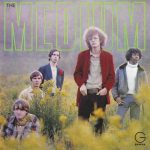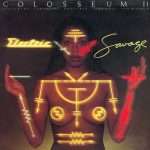Trojan Horse – World Turned Upside Down (2014)

Artist: Trojan Horse
Album: World Turned Upside Down
Genre: Crossover Prog
Label: Bad Elephant Music
Year Of Release: 2014
Quality: FLAC (tracks)
Tracklist:
1. Jurapsyche Park. 4:39
2. Sesame. 6:55
3. Interlude. 0:42
4. Scuttle. 8:06
5. See Me At The Crow Bridge. 1:12
6. Centrelude. 0:36
7. World Turned Upside Down. 6:02
8. Hypocrite’s Hymn. 12:24
9. Death And The Mad Queen. 3:54
10. Behemoth. 4:09
11. Paper Bells. 5:39
12. Outerlude. 1:24
13. Fire! Fire! 1:43
Personnel:
– Nicholas Duke / guitars, keyboards, Hammond, percussion, vocals
– Eden Duke / keyboards, synths, bass, vocals
– Lawrence Duke / bass, guitar, percussion, vocals
– Guy Crawford / drums, guitar, vocals
With:
– Kavus Torabi / lead guitar (1)
– William Gary Hamer / trumpet & trombone (2,4)
– Semay Wu / cello (5,7)
– Edward Sprake / ukulele (7,8)
– Elaine Duke / backing vocals (8)
– Chloe Herington / bassoon (9)
– David Hopkinson / bass (9)
– Danny The Red / drums, synths, guitar, percussion, vocals, production & mixing
There are some bands that only properly make sense at volume eleven in a state of altered consciousness, and Salford lads Trojan Horse are one of them. They are a new band to me, but this is their second album. The first cannot be as gloriously untrammelled as this one, surely? Anyway, that’s a job for later on. For now we are happy to be happy with what we have to be happy with, and World Turned Upside Down will keep me grinning a while yet.
Opener Jurapsyche Park, a dinosaur-on-steroids of a tune bursting with testosterone charges out of the pen in a late-period Crimsoid fashion before becoming almost Zeuhl-like in its intensity in the latter half. That there are three brothers in this band comes as no surprise, for this track is for all intents and purposes an aural record of sibling rivalry that just about manages to stay this side of fisticuffs. It must be a corker live, for sure!
Of the three brothers Duke, Nicholas Joel, or Nicholas Wyatt as he has taken to using because of his laudable obsession with the iconic songwriter, is presumably the one who gets to take the lead vocal parts most often, although as you can see from the line up, they all take a hand in the vocalising department. Nicholas is not possessed of the strongest voice in the world, which might have made a difference had the music not been so shockingly feral; it matters little in the greater scheme of things. Also, I had guessed that there may well be some wild facial hair in this band before I had even seen a picture of them…
After the brutal assault of the first track, picking itself off the ropes and staggering into the corner for a breather is Sesame, seven minutes of off-kilter modern psychedelia that readies the listener for the rest of the journey. All bouncy keyboards, jangly guitars and mostly nonsense vocals all taken at a leisurely pace, it deceptively builds to a climax with the band repeatedly declaiming “I can see this going nowhere” followed by a final triumphal burst of post-rock thrrang and more “bwah-bwah” vocal chirping before inevitably suddenly stopping; clever chaps these Trojan Horse fellas.
The growing psychedelic element to the album is apparent from Interlude, a short amalgam of other tracks on the record in various states of undress. Untangling singers’ diction has never been a strong point of mine, right back to the time when I was knee-high to my dad when I used to run round the house singing along to Roy Orbison’s “Freddy Woman”, so Scuttle is largely lyrically indecipherable to me. It begins like aural crazy paving borne aloft on darkly psychedelic atmospherics, before appropriating elements of dub reggae, of all things. It shouldn’t work, but it does.
The album takes its title from a 17th century radical pamphlet of the time of the English Civil War by “T.J.”, the subtitle of which was “A brief description of the ridiculous fashions of these distracted times” – nothing changes, really! Trojan Horse give the impression of being imbued with a keen sense of social injustice, but the lyrics, metaphorically scrawled with the burnt end of braches torn from trees onto paving slabs, are punky-psychy in tone, and occasionally angry in enunciation. Due to the complete absence of lyrics written down and my previously mentioned struggles with Mr Duke’s diction they are more impressionistic than anything, as I rely on snatches of lyrics caught here and there.
However, Paper Bells definitely goes for the heart of the matter; that much I can tell, and it leaves no doubt with a Beatles-esque section under heavy manners in the middle of the song. As the PR blurb states, one of their inspirations is “…lives lived under the foul austerity policies of an unwanted government”. Too bloody right, and it makes a good change to see an ostensibly “prog” band get political, a subject most shy away from. Any questing mind that turns to art must surely have a keen awareness of its political surroundings, and to ignore that side of things is a dereliction of duty as far as I’m concerned.
OK, rant over…see what this band are doing to my head? See Me At The Bridge is a lovely short interlude of cello and synth followed by more sonic mashups on Centrelude. The title track ventures gamely into acid-folk rock, and there is another nice serving of cello in there for good measure. The cello also appears later on Death And The Mad Queen, and unless it is a highly convincing synth patch, it’s a shame it and the other strings are not credited on the Bandcamp page. This may not be the case with the CD, but I only have a review download to go on. Anyway, whoever you are Mr or Ms String Section, hats off to you.
I have listened to Hypocrite’s Hymn more than a few times, and it is still a mystery to me, but in a good way. This unruly rabble of a “song”, and I use the term advisedly uses several style and tempo changes, backwards sections, layering to the point that in places at least three melodies seem to be having a fight in a kitchen sink, ambient synth soundscapes, odd time signatures, and a bucketful of studio trickery. And it’s bloody marvellous!
At over twelve minutes, and by far the longest track on the record, could it be that it started out as a pisstake of the obligatory “prog epic”, but they ended up having so much fun it was a case of “Nah, leave it”, as Percy once said? Another bonus is a completely over the top synth solo so unsubtle and pointless it would make even Keith Emerson blush, so much so it brought a wide smile to my care-worn fizzog. Be assured; there was no talent or electricity wasted in the making of this musical larking about. I am told seeing this one played live is quite an experience, and I can well imagine it is!
After that joyous racket, we are soothed by Death And The Mad Queen, a song in the style of Circulus’ prog-folk whimsy, but with a caustic edge that may well be a tilt at organised religion. Behemoth is a welter of crashing chords and bursts of fiery guitar notes, shot through with the Horse’s peculiar brand of psychedelic wooziness.
World Turned Upside Down is a place where Trojan Horse are joined in spirit by The Fierce And The Dead and Knifeworld, the three corners of a new heavy psych-prog triangle squaring up to one another in a three-way over 13 rounds of rumbustious bare-knuckle noisefest. In fact those three bands once went on tour together in what was probably an earplug-melting cacophony of a bill! World Turned Upside Down is an album of fierce independent spirit and unstoppable energy with a joy in its own existence that fair jumps out of the speakers and into your lap, demanding attention like a feral cat that decides to move in for the night whether you like it or not. While a completely different denomination to North Atlantic Oscillation, they are two examples of a similar musical currency, and proof positive that progressive music making is alive and well in the UK.
Let Trojan Horse roll into your listening space hidden in plain sight, where they will disgorge a phalanx of aural mischief that will play havoc with your preconceptions of what “prog” can be – and you know what, if you don’t like it, I shouldn’t imagine they would care a jot.
by Roger Trenwith



